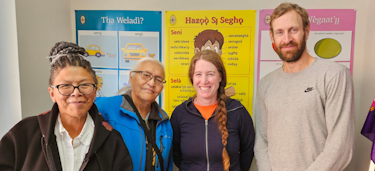Child Development Monitoring from 0 to 5 Years (In French)
This workshop offers you an understanding of the motor, cognitive, language, socio-emotional, and sensory development stages of children aged 0 to 5.
Free
Our cookies and those of our partners help improve your experience and analyze your use of the website. To learn all about cookies, check our privacy policy

Access to learning Indigenous languages remains a major challenge for many remote communities in Northern Canada. The lack of internet infrastructure and local resources complicates the transmission of these languages, which are essential to the preservation of cultural identities. In the Tłı̨chǫ communities of Whatì, Gamètì, and Wekweètì, these obstacles make it difficult to teach the local language and to pass it on to new generations.
The revitalization of Indigenous languages, a priority for Collège Nordique
Considering the priority given to the revitalization of Indigenous languages, it is imperative that every community member has access to learn their ancestral language. This revitalization process cannot be complete if barriers prevent certain populations from participating. It has therefore become essential to find ways of meeting the needs of the most remote communities.
Collège Nordique and the Tłı̨chǫ Government have joined forces to put in place a solution: immersion courses in communities.
Community immersion courses: addressing the access to learning challenges
In the spring of 2024, during a visit to Behchokǫ̀ by Rosie Benning, Director of Education and Training, Georgina Franki, Tłı̨chǫ instructor, and Patrick Arsenault, Executive Director of Collège Nordique, the Tłı̨chǫ Government shared that they were planning to organize a language immersion camp. Naturally, Collège Nordique offered its expertise in language teachering and the idea of collaborating on the project with the Tłı̨chǫ Government emerged. In June 2024, planning meetings were held to prepare for the implementation of these immersion camps starting in August. These camps aimed to offer direct access to Tłı̨chǫ language learning for remote communities. In these regions, where the internet is limited or non-existent, it was crucial to offer in-person learning, adapted to local realities.
60 hours of immersion for each community
The Tłı̨chǫ Immersion project was designed to offer 60 hours of language immersion in each of the Tłı̨chǫ communities: Whatì, Gamètì, Wekweètì and Behchokǫ, as well as Yellowknife. Classes took place mainly in the cultural centers of each community, where participants were able not only to learn the language, but also to reconnect with their culture through storytelling and intergenerational exchanges.
Georgina Franki, teacher of the Tłı̨chǫ course at Collège Nordique, led the training sessions, accompanied by Jody Zoe, Judy Zoe and Celine Eyakfwo, language champions employed by the Tłı̨chǫ Government. Each camp was designed to include Elders, the holders of traditional knowledge, who shared stories, thus strengthening the transmission of Tłı̨chǫ culture.
The participants in each of the communities had a great time! In Whatì, for example, the grandparents came with their grandchildren to play What time is it Mr. Wolf together. It was beautiful seeing the grandparents and their grandchildren playing, learning, and laughing together. Two of them said:
“We love this! We are going to continue doing this even after the camp is over. It’s so much fun!”
Upcoming camps in 2025
The “Tłı̨chǫ Immersion” project continues, with camps in Behchokò on Saturdays starting in January 2025 and in the other Tłı̨chǫ regions during the month of March. This camp will mark the end of this first phase of the project, which we hope will continue to thrive in the coming years. Through this initiative, Collège Nordique and the Tłı̨chǫ Government reaffirm their commitment to language preservation by making language learning opportunities more accessible to participants, regardless of where they live.
Acknowledgement and gratitude
We would like to express our deepest gratitude to Theresa Mantla, Cecilia-Zoe Martin, Corine Nitsiza and Rita Mantla, who generously shared their knowledge and stories. Their involvement has been essential to the success of the immersion camps, and their contribution to the transmission of Tłı̨chǫ culture is invaluable.
Together, let's continue to work for the revitalization of Indigenous languages and to strive to offer every community the opportunity to reclaim their linguistic and cultural heritage.
Loading
Thank you for subscribing